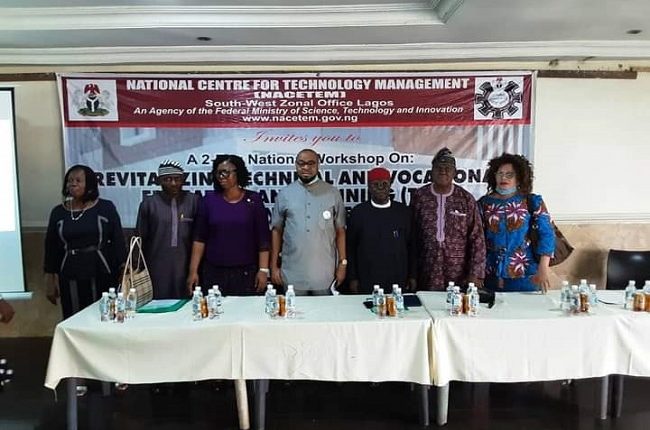
Stakeholders in the education sector have stated that there is a need to increase youth development through Technical, Vocational, and Entrepreneurship Training (TVET) in order to address the country’s unemployment problem.
According to them, TVET plays a significant role in reducing unemployment among the country’s teeming youths and in addressing the country’s current economic issues.
On Wednesday, experts spoke at a workshop on Revitalising Technical and Vocational Education and Training (TVET) for National Development, hosted by the National Centre for Technology Management (NACETEM).
Professor Okechukwu Ukwuoma, Director-General of NACETEM, highlighted at the workshop’s start that TVET is a type of education that focuses on the learning of practical and applied skills, as well as basic scientific knowledge.
Ukwuoma revealed that the workshop’s major goal was to examine the difficulties confronting TVET in Nigeria in order to arrive at a holistic and sustainable solution, as well as to provide a venue for networking, connections, and collaboration among TVET stakeholders and practitioners.
“The importance of TVET cannot be overstated, which is why it must be consistently engaged to drive progress.”
“The emphasis on practical skills in TVET identifies it as an education that not only prepares students for the global stage, but also creates stronger relationships between and/or among all concerned.”
“As part of our commitment to employing technical and vocational education to address the country’s unemployment problem, NACETEM, as a government agency, has organized a similar workshop in the South-West, notably in Ibadan, Oyo State, in the last six months.”
“This demonstrates our deliberateness in reaching out to all six geopolitical zones of the country in order to revitalize technical and vocational education in Nigeria, as there is no substitute for skill acquisition in attaining sustainable development.”
“Today, the South-East and neighboring zones will see how important TVET is in developing wealth and meaningful employment in the country.” Let me state unequivocally that no section of the country will be overlooked in ensuring that TVET takes its rightful role in the push toward sustainable development!”
Mrs Mary Ngozi Onyejeke, zonal coordinator of NACETEM, South-West Office, Lagos, also spoke, describing TVET as a key component of basic education with the potential to educate and employ our teeming young.
According to Onyejekwe, TVET allows for industrialization, or the transition from a consumer to a producer state.
“Our economy now is beset with various issues, including significant youth unemployment, excessive reliance on crude oil, a skewed trade balance in favor of foreign imports, and widespread avoidance of locally created items,” she stated. The development of Nigeria’s capacity to learn, absorb, and disseminate existing new knowledge is a serious challenge.
“It is therefore critical to train and re-train local manpower to fully participate and adequately execute projects and contracts in the country. We must be able to use, not only our heads but also, our hands to do whatever we need to do. Local content development is imperative!
“It is a well-placed strategy for equipping our population with practical, modern, occupational and skill-based capacities. This will go a long way in helping the country to create jobs, grow local industries, enhance science, technology and innovation (STI), conserve foreign reserves, encourage SMEs, and improve domestic incomes. Hence globally, TVET is widely recognized as a vital driving force for the socio-economic growth and technological development of nations.”
Sir Obi Kama, Commissioner, Enugu State Ministry of Science and Technology, stated in his speech that the country’s unemployment problem is solved through Science and Technology Education.
“The solution now is to get abreast with the Technical and Vocational Training varieties available in contemporary Technical and Vocational Skills acquisition programs.
“This is hence the way to go in salvaging the youths from mass unemployment. This is achievable with reviewing our existing curriculum in Schools towards emphasizing the inculcating of these Trades and Skills for self-reliance,” he said.